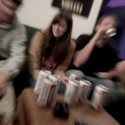A path to recovery
Michael Walsh lost 16 years to alcohol and cocaine addiction. Now sober, he’s trying to help others find their way out through a new secular peer-support group called LifeRing.
Alcoholics Anonymous was instrumental in his recovery, but as an atheist, Walsh, now 41, struggled with the concept of the higher power found in AA’s program.
At seven years of age, Walsh’s mother and alcoholic father divorced. At the age of 10, he had his first brush with marijuana, cigarettes and alcohol. From the age of 12 to 17, Walsh was sexually abused by an adult male from the Lower Mainland.
“I shut down mentally,” Walsh says of that period. “I withdrew from a lot of friends and family. It was very traumatic. I was embarrassed and ashamed. My family had no inkling this was happening. I think they still don’t know.”
Today, Walsh’s appearance is clean-cut, his voice soft. Seated in a spotless downstairs suite that he shares with his girlfriend on a tree-lined street of mature homes in Victoria’s Fairfield district, Walsh lets the dark details of his past tumble out slowly.
His eyes moisten, and he knits his fingers together as he ponders the damage addiction has wreaked upon his life and the lives of those around him.
A residential rehabilitation program, psychologists, psychiatrists, AA and group therapy all helped Walsh attain sobriety. He says weekly meetings are essential to maintaining that state, but the only weekly meetings he could find were connected to AA.
“At the end of meetings, we’d hold hands and say a prayer, or there was hugging,” Walsh says. “I was never comfortable with that degree of physical contact.”
He learned that others in the recovery community shared his desire for a secular support group, so he connected with LifeRing, a 100-group network with its base in California.
“You’re dealing with enough when you’re fighting an addiction, you should be able to direct that recovery in a way that gives you as few roadblocks as possible,” Walsh says.
Amen to that, says Irene, a representative at AA’s international office in New York. In keeping with AA’s philosophy, she asked that we not print her surname. AA does not comment on other addiction support groups, to offer endorsement or criticism.
Irene notes that AA’s membership covers the whole spectrum of belief from atheists to those following a particular faith.
“They’re all accepted completely as they are,” Irene says. “There’s no conformity required.” As for the higher power, members are encouraged to interpret that in any way that is helpful, from calling the people in their meeting group a higher power to giving it a specific religious designation.
Irene says there’s no real way to measure AA’s success or how many rely on a higher power for recovery, as AA keeps no records or attendance sheets and collects no dues or fees.
“We do hear of studies saying we have a certain success rate, but I don’t know how they got those numbers when we don’t collect data ourselves,” Irene says.
Walsh is quick to say he has no desire to criticize AA. “AA was invaluable to me in my recovery.”
Walsh’s tone is similar to that of clients seen by Drew Barnes, acting manager of rehabilitation and case management at Eric Martin Pavilion. Barnes says he hasn’t heard clients speak in strong negative terms about having a spiritual component in their recovery, but he says the addition of a new resource in Victoria is a good thing.
“Addiction-recovery is highly individualized,” Barnes says. “The greater the diversity of resources, the greater the chance that individuals will find something to fit their needs. Some people might use both an AA and a LifeRing resource together.”
LifeRing meetings are much like AA. Peer support and a commitment to complete abstinence from addictive substances make up the basic tenets of both programs.
AA members use a 12-step program and have mentors called sponsors, people who have overcome their addiction. LifeRing utilizes neither. Instead, it uses cognitive behaviorism, motivational interviewing, solution-focused therapy and other clinical approaches to recovery.
Cameron Delacroix is an outreach worker with the Umbrella Society. He says, “There’s a million different paths to recovery from addiction, and the more things that are available to people, the better. It’s (LifeRing) had good success in other places and we’re very happy it’s here in Victoria.”
George Lowery, acting co-ordinator for Vancouver Island Health Authority’s Withdrawal Management Services, agrees. “The more options we can give a person in any stage of their recovery, the better. Will it be an answer for some? Yes. For others? No.”
source: http://www.canada.com

